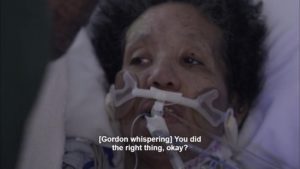
The gut reaction to Netflix’s new documentary “Extremis” is the ICU is a hellhole. No one wants to end up there. Patients enter this purgatory after becoming sick and requiring a higher level of care. Patients enter the ICU from the ER, the hospital ward, or after surgery.
Donna, one of the two patients featured in the film, has myotonic muscular dystrophy. Her muscle weakness caused respiratory failure, and she needed a breathing machine. Donna has to choose between having the tube removed and having a permanent tracheotomy. The tracheotomy requires Donna has to live in an extended-care facility. Removing the tube means that she will die.
Mindful considerations identify upsets before they happen. The purpose of advance care planning is to avoid the pitfall that Donna had encountered. Muscular dystrophy has no cure. What Donna had to endure was unnecessary and torturous. Donna was competent so she had to fend for herself against the physicians and her doting family.
3 Mindful Considerations for advance care planning include:
Avoid the bridge too far.
To what extreme is it necessary to keep you alive? At what age would you avoid admission to the ICU? Do you understand that you will be in the ICU following surgery? Do you understand that calling 911 could lead to an ICU admission? Is your medical condition expected to get better? What quality of life will you enjoy after leaving the ICU? “We’ll cross that bridge when we get there,” seems to be the best copout for advance care planning.
These are questions that you prefer not to think about ahead of time and are often left open-ended. Advance care planning that is open-ended will likely cause you to cross a bridge too far and take you into the ICU. Elderly patients who are reluctant to sign a Do Not Resuscitate (DNR) often die in extremis in the ER or ICU.
Refuse nonviable options.
“I can’t live like this” becomes a personal proclamation for advance care planning. “I do not want _______” becomes a matter of choice. You might begin to fill in the blank by refusing certain medical procedures:
Heart transplant Colostomy bag Breathing Tube Feeding tube Cardiac resuscitation Needle sticks Medical Specialist Dialysis Extended-care Chemotherapy Antibiotics Blood Transfusions
Would any doctor in Donna’s situation choose to have a tracheotomy? Should doctors offer nonviable options to every patient as a matter of choice? Who determines if a particular patient can live with a tracheotomy? Is living with the prospect of dying ever a viable option? How do patients get the inner strength to give up on hope and to refuse medical intervention?
Donna was looking at a longer course of pain and suffering with no hope of recovery. Sadly, this seems to be the best practice of medicine today. Patient-centered care calls for advance care planning that focuses on personal dignity. Nonviable options lead to patient indignation.
Put your promises in writing.
The quality of your death is a matter of choice with no guarantee. Those who rely on good faith often die in extremis. We all know the importance of getting our guarantees in writing, yet many people fail to do so. They trust in God and the healthcare system. Advance care planning provides the means for you to maintain control over the decision-making process. Being mindful requires taking responsibility for both your life and death.
Mindful considerations help you balance refusing and receiving medical intervention. Entitlements are what you receive. Empowerment allows you gain dignity through refusing intervention. Donna had to choose between entitlement and empowerment- suffering and freedom. Had she made a promise to herself about this choice? Were others aware of it?
How did Donna feel about corporal punishment? Was the breathing tube necessary? Was a permanent tracheotomy acceptable? Does the prospect of corporal punishment prompt you to get things in writing?
“Give me liberty or give me death” are the immortal words of Patrick Henry. Is it important to include these words in your advance directive? “Give me extremis,” as in inhumane treatment, is absurd.
Be mindful of what you wish for and put it in writing. If you do not wish to suffer in extremis, plan ahead. Be mindful that withholding life support supports personal freedom and everlasting peace.
Subscribe to Dr. H’s Clipboard –
Caregivers often suffer in silence while looking after loved ones and grieve in the aftermath of their death.
These twice a month email tips help caregivers understand that pain and suffering are inevitable – grieving is optional through better advance care planning.
Let’s start developing a community that creates and grows understanding, knowledge and support for compassionate end-of-life care.
Leave a Reply